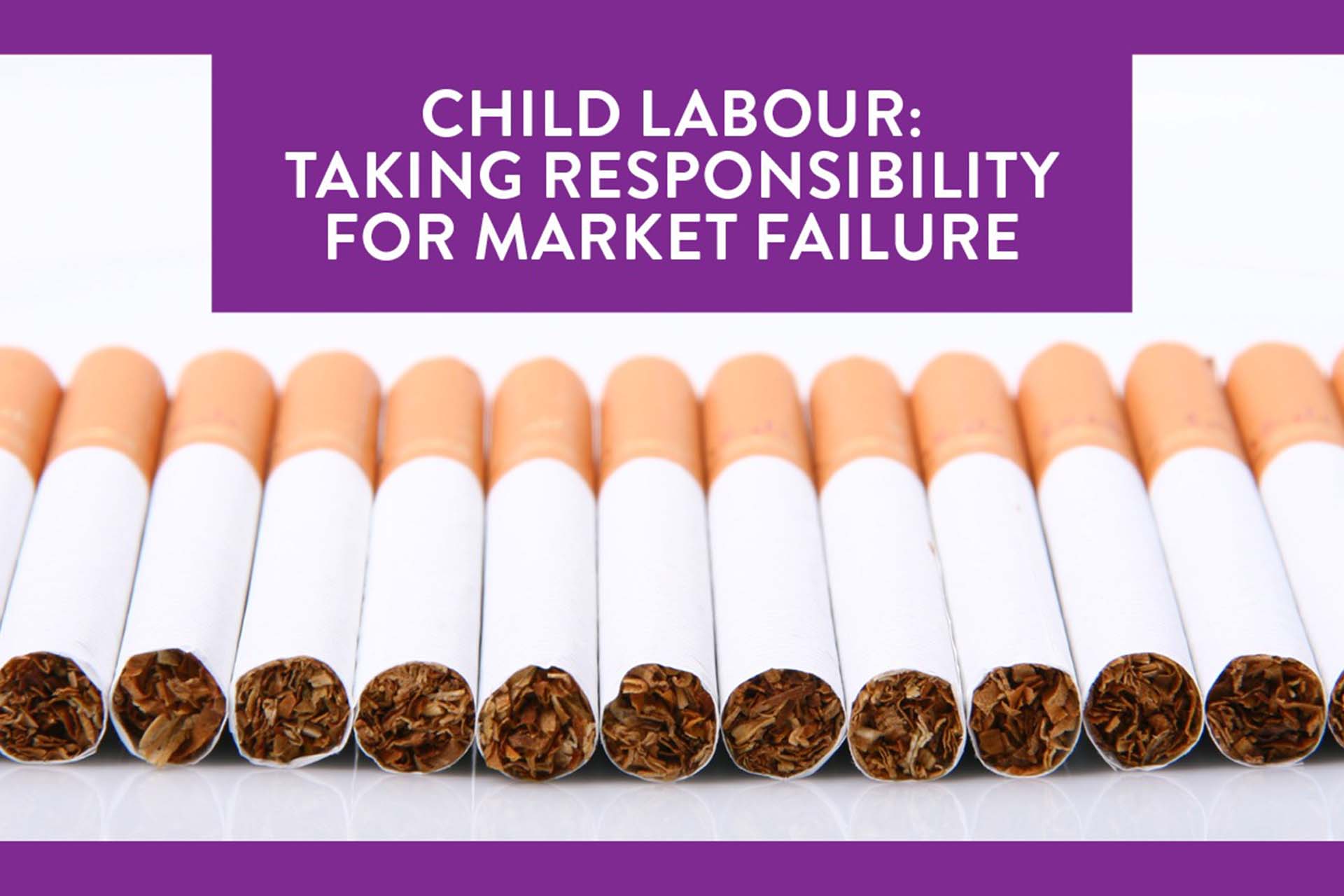
Why is child labour found in the supply chains of some of the UK’s largest multi-national corporations?
Market failure.
Large multinationals (MNCs), e.g. Nestle, British Tobacco, H&M, do not purposefully exploit the children who help to harvest their cocoa, grow their tobacco, or stitch their t-shirts. But they do use their influence to drive down the prices they pay suppliers and then fail to vet and monitor those suppliers to ensure employment standards are being met.
This business model is pushing children into forced labour. MNCs need to sort it out and prevent this harm from occurring.
In this blog I will use the example of British American Tobacco (BAT) to draw out these ideas: the company is alleged to have used suppliers that paid ‘poverty wages’ to families in Malawi for working the tobacco fields, which forced many children to forego school and work instead(1).
Market failure and the externality of child labour
Market failure is an equilibrium in an unregulated market which is inefficient. One type of market failure is the existence of a negative externality, where the social cost of producing a good or service is greater than the private cost faced by the firm to produce that good or service. The producer does not take into account the additional cost, which is typically borne by a third party. A classic example is the negative externality of air pollution. The plastics factory emits the air pollution, but it is the local community that bears the cost every day on their way to school, church and work.
Through this lens, the social cost to produce tobacco, which includes the physical, psychological and economic cost associated with child labour, as greater than the private cost faced by tobacco suppliers (i.e. farmers) to supply the tobacco to BAT. As a result, the quantity of tobacco purchased on commodity markets by Alliance One (the company BAT commissions to buy tobacco on its behalf) is not optimal. ‘Internalising’ the social cost – i.e. stopping suppliers from using child labour – would see producers face steeper costs, decrease supply and the price of tobacco will subsequently rise. Excise duties currently placed on tobacco products imported into the UK rely on the same logic – they increase the price of supplying tobacco, with the intention of lowering the quantity demanded.
Why is there a market failure?
Clearly BAT and its suppliers are not taking into account the externality cost borne by the working children of tenant farmers. But why?
When a few firms dominate the purchase of a commodity (or service, or factor of production) the market structure is characterized by oligopsony. This is a situation with a few large buyer firms, and many sellers. Purchase of tobacco on the commodity market seems to be a good example of oligopsony – there are five extremely large tobacco companies (including BAT, based on sales in $USD) and many small tobacco farmers worldwide. Using a cost-minimisation strategy to ensure production efficiency, BAT will dictate terms and set the lowest price possible for tobacco contracts with Alliance One, who will then seek cheap tobacco on the commodity market to fulfil the quantity ordered. Suppliers then have little alternative but to accept the prices set as they have few other buyers to purchase their product.
This strategy does not purposefully target children, but it does squeeze the margins of suppliers, putting downward pressure on the wages suppliers can pay. Subsequently, suppliers will engage in nefarious practices to push these costs onto workers. In Malawi, farm owners will lie about potential pay and conditions to recruit workers from poor villages. Once those workers arrive, predatory loans might be offered as the only way to pay for essentials like food and accommodation. Workers are then quickly in situations of debt bondage to their employees and may need to provide the labour of their children to keep up repayments.
But why don’t MNCs investigate and put a stop to these types of practices?
Incentives.
Regulators in the UK have taken a light-touch approach to the issue. The Modern Slavery Act 2015 requests that companies with turnover above £36m make a statement each year on what they are doing to tackle modern slavery (which includes child labour) in supply chains – but in many cases firms have written little more than a paragraph to no consequence. Legislators have not opted for binding policy instruments such as mandatory due diligence or chain liability, which might change the incentives of firms. Instead, MNCs are faced with the options of minimising costs (production efficiency), or undertaking expensive, voluntary monitoring across their complex global supply chains. And if the Head of Supply Chain does uncover human rights abuses or failures to meet local employment standards, she knows that it will only increase the firm’s costs to shift suppliers. And the Board may not take kindly to that proposal.
Firms have no economic incentive to engage in due diligence and extensive monitoring. And the externality remains a cost pushed on to child labourers and their families.
What can we do?
Customers need to accept that the prices of some consumer goods may need to rise if exploitation is to be avoided in supply chains. They should do the best research they can especially for high-risk products like sugar, cocoa, coffee and clothing.
NGOs need to focus on arguing for policy changes that will change firms’ underlying incentives, with mechanisms that can punish bad behaviour and potentially reward good behaviour. These include joint liability regimes for wage non-compliance, mandatory human rights due diligence and introducing ‘hot goods’ provisions.
But mainly it is businesses that need to change. The regulatory landscape will eventually catch-up with our ethics and clamp down on firms that rely on child labour in their supply chains. To stay on the right side of history, businesses need to prioritise the identification of exploitation within their supply chains. Directors with responsibility for Human Rights or for Supply Chains should be given greater responsibility within companies, with bonus structures incentivising transparent reporting of risks and mitigating actions.
By George Ritchie
1 Note that BAT is fighting to dismiss the relevant legal case before it goes to a full trial at the UK High Court.


